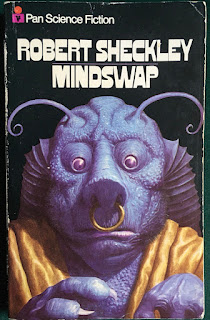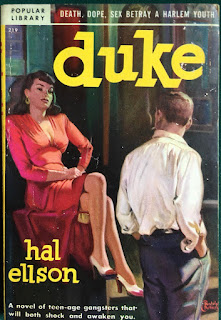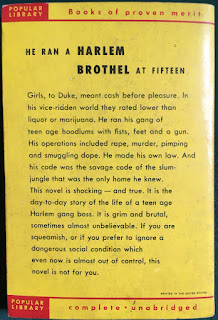Williams is not being removed from my hunting list. This book was great. It started out solid, well-written though the set-up seemed a pretty classic situation of the loner guy new in town who gets caught up in bad things in the town. The main theme also seemed a bit simplistic and blatant as well; the guy is caught between the world of crime and sin that his bad side led him to and the safe legit world opportunity that the town presented to him. However, as the story moves on, the complexity of the situation and the deeper and deeper shit he gets himself into and the really unexpected yet darker ending than I expected took this book into the upper echelon of noir fiction.
Madox is a bit of a drifter, not a super-bad guy but not great either. After leaving the navy, he gets in a brawl in Houston so hits the road and ends up in a small town in Texas where he finds a job selling cars. He's definitely disgruntled, arguing with his boss and spending his nights tossing and turning in his way too hot boarding house room. Right off the bat, things get a bit weird, when he is sent with the attractive and nice young lady, Gloria, from the loan business across the street (owned also by his boss at the car lot) to go repossess a car. The guy who bought the car is a roughneck, working as a security guard near an oil rig in the forest. Here we get a great game-recognize-game moment and an example of some of Williams' great hard-boiled prose:
He was a big man, around six feet and heavy all the way up, and walked with a peculiar short stride which some people might have called mincing but wasn't. It was the flat-footed shuffle of a bear or a heavyweight fighter, and men who move that way are balanced and hard to push off their feet.
Sutton behaves with nasty and smug contempt towards Gloria, like he has something over her. This is the biggest mystery of the book, but slips to the background as Madox begins to dig his hole.
First, he has an affair with the ripe, near spoiling, wife of his boss. She is a fantastic character, coming off at first as just a bored, stupid sexpot but revealing layers of deceit and nastiness as the book goes on. She is super hot and sexy and Madox at first can't resist and then when he can, she has the leverage on him and starts to apply it:
"I love talking to you," she said, smiling. "We understand each other so well. You know, in a lot of ways we're just alike."
"Isn't that nice?" I said.
"Yes, I think so. Now kiss me like a good boy, and tell me you like me better than that skinny little owl."
There was no way to kiss her like a good boy. You could start out that way, but you always ended up on the other side of the tracks. If you hated her, it didn't make any difference; it worked just the same.
Such a great line! Then, by chance, when there is a fire in town, he goes into the bank and finds it empty but for one old man, which sets him thinking of how he can rob the place, which he does. This is an incredibly tense and creative scene, as the only thing that goes wrong is Mort, the old blind African-American who sells pencils on Main street, walks in and senses something wrong. He can hear Madox's breathing and tracks him as he tries silently to sneak out of the bank. Such a great idea for the thing to screw up the robbery. Nevertheless, Madox succeeds but then his hole only gets deeper.
He starts to actually fall in love with Gloria, and she back. But she cleary has some twisted connection to Sutton and Madox keeps trying and failing to stop fucking his boss's wife. Everything just gets worse and worse, of course, while Gloria and Madox's love gets more and more real. It's a great contrast of highs and lows as you read it. The simplicity of the theme, rather than becoming obvious, gets more and more mired in the craziness of the situation. Life keeps handing Madox opportunities to lead a great, legit life with Gloria, but he is already in so deep with all his crimes and lies that you know he's fucked.
Great book.
Addendum: I just did a bit of internet research on the movie and it looks quite good. The casting of Don Johnson, Virginia Madsen and Jennifer Connelly seems quite good and it was directed by Dennis Hopper. I'm going to check it out. I'm a big fan of those '90s noir/thrillers anyways. I also notice that the original title of the book appears to be "Hell Hath No Fury" which is way better. Some idiot producer high on coke probably changed the title and Black Lizard then changed the book to get some movie sales.
SPOILER ALERT HONESTLY READ THIS BOOK THE SPOILER IS FOR MY OWN REFERENCE
<spoiler select to see>This is what makes the ending so great. Williams totally flips the traditional noir ending, so that while Madox lives and even gets away with it, he gets completely trapped by Dolores and is forced to marry her, take over the car and loan business and go totally legit, all the while working with his love (that Dolores forced him to reject). He even succeeds in work and life, thinking about running for town council but he is miserable and must keep his wife alive for as long as he can because if she dies, she will expose him. Just the worst.</spoiler>































